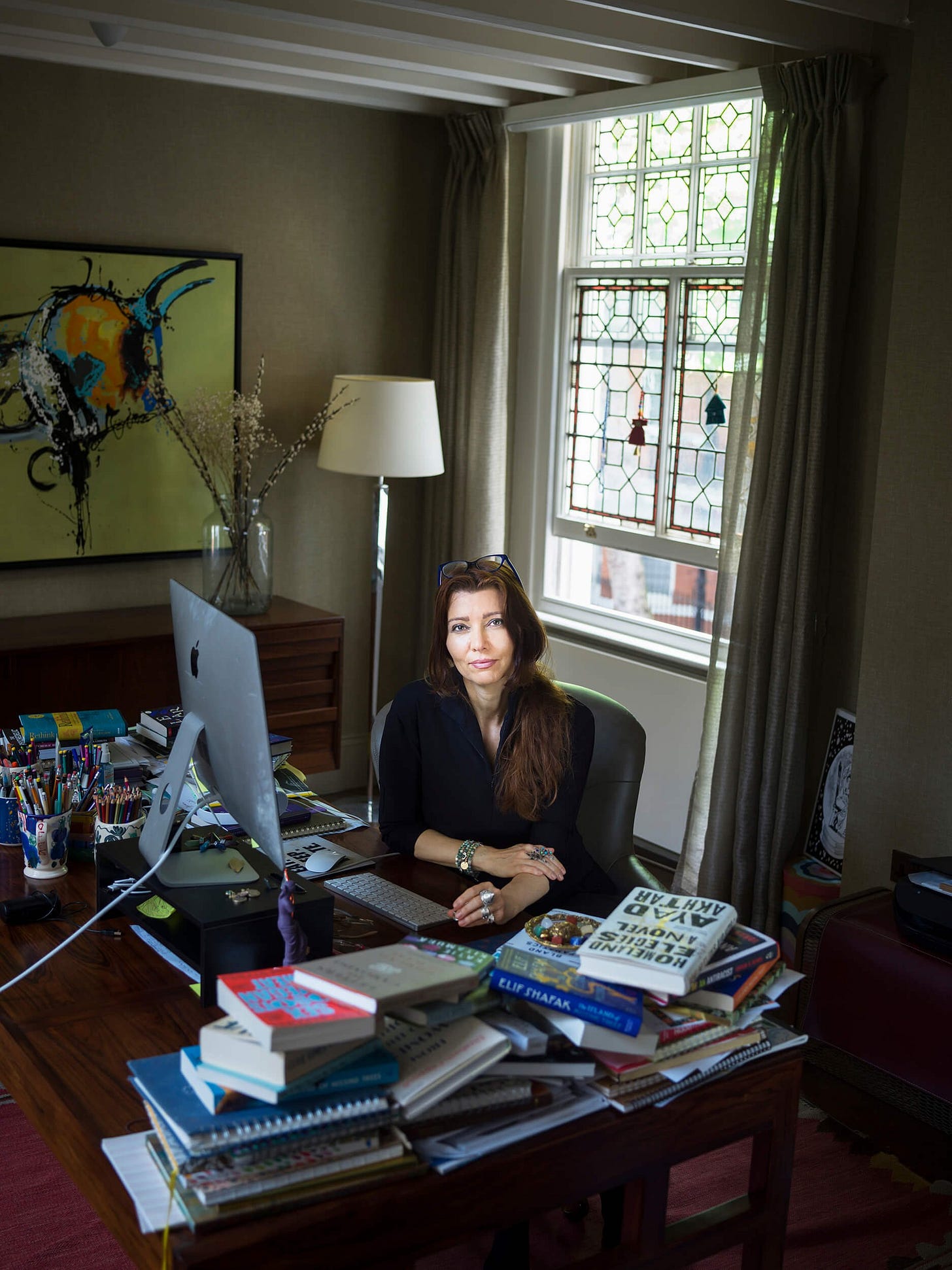Why Rigid Writing Schedules Are for Privileged Men
How Elif Shafak finds inspiration in noisy places, juggles languages, and writes with love.
Welcome to the 6th installment of our Habits Series where we highlight the creative habits of your favorite writers. Previous installments include Joan Didion's journaling habits, Ray Bradbury's technique to generate ideas, and how Neal Stephenson makes time to write.
If you enjoy this piece please consider subscribing or sharing with a friend. Every bit counts. Enjoy!
Elif Shafak - Novelist - Essayist - Political Scientist
Elif Shafak is an award-winning British-Turkish writer and the author of 21 books, including bestsellers like The Bastard of Istanbul, The Forty Rules of Love, and Three Daughters of Eve.
In addition to her literary achievements, Shafak is a political scientist and academic whose work has appeared in major outlets like The Guardian and The New York Times.
In 2017, Politico named her one of 12 people who could make the world a better place.
The quotes below are from her interview with Writing Routines, offering insights into her creative process.
Writing in Chaos
Unlike many writers who seek out solitude and order, Shafak thrives in noisy, unpredictable environments. For her, chaos sparks creativity.
I write sometimes at home, sometimes in the noisiest places: restaurants, airports, train stations… I don’t like silence to be honest. And I panic if I am in a neat, tidy environment where everything is perfect. I operate better in chaos. I prefer to be surrounded by the sounds of the street, the sounds of the city…. I don’t have a specific routine that I abide by day after day, season after season.
Shafak’s flexibility is also a necessity. As a mother, she understands that creative schedules often need to bend to the demands of daily life.
When you are a mother of small children, you cannot have a precise schedule anyhow. No offense, but it’s usually male authors of a certain age or a certain privilege who are extremely fond of their unchanging schedules. The rest of us, female and male authors of all backgrounds, we try to carve out a time, a personal space whenever we can, wherever we can.
This perspective highlights how privilege often shapes creative habits. For many writers, especially caregivers, the ability to create isn’t about protecting an ideal schedule but about finding moments to write amidst the chaos of everyday life.
Writing Across Languages
Shafak’s work as a bilingual writer adds a unique layer to her process. She writes her novels in English but then rewrites them after they are translated into Turkish.
I write my novels in English. Once they are translated into Turkish, I take that translation and rewrite it. So it’s a bit insane. But I love the freedom, the sense of endless possibilities that you experience in that journey. Even so, over the years I realized when it comes to sadness, melancholy, longing… I find these things easier to express in Turkish, whereas humor, irony, and satire are much easier in English.
This dual-language process not only shapes the tone and texture of her work but also highlights how language itself influences storytelling. Different emotions and ideas flow more naturally in certain tongues, and Shafak’s ability to navigate both expands the depth of her stories.
A Scholar’s Perspective
Shafak’s academic background deeply informs her writing. As a political scientist, she brings a multidisciplinary approach to her novels.
I have always liked and treasured interdisciplinary studies: political philosophy, gender and women’s studies, cultural studies… Writers are readers, primarily, and they should always remain readers. In other words, we have to keep reading, reading. But novelists should not only be reading novels in my opinion. I believe it is intellectually much more challenging and stimulating to have eclectic reading lists: fiction and nonfiction, East and West.
Her broad reading habits allow her to draw from diverse traditions, ideas, and cultures, enriching her work with layers of meaning. For Shafak, great writing stems from curiosity and a willingness to explore beyond the familiar.
See also: Sally Rooney on Reading to Overcome Writers Block
The Challenges of Writing
Even with her experience, Shafak acknowledges that writing is never easy. The process is full of highs and lows, no matter how many books one has published.
Whether it’s your first book or tenth, it’s interesting that you will almost always go through tunnels of anxiety, tunnels of self-doubt, and then there will be days bright and extremely productive. Each day is different, so is every book, of course, but the writing process is always replete with ups and downs. It never gets easier.
This honesty about the struggles of writing is both comforting and inspiring. It’s a reminder that doubt and difficulty are universal, even for seasoned authors.
See also: David Foster Wallace On Perfectionism
Writing as an Act of Love
At the heart of Shafak’s process is a deep love for storytelling.
Writing fiction is primarily a work of love. Before anything else, above everything, it is about this profound love you feel for the art of storytelling. Where does it come from, that love? How is it possible? I don’t know. All I know is, whenever in doubt, please remember the love and let it be your guide.
This love is what sustains her through the challenges and chaos. For Shafak, writing isn’t just a craft—it’s an act of devotion to the stories that connect us all.
Elif Shafak’s approach to writing blends chaos, adaptability, and a deep passion for storytelling. Her words remind us that creativity doesn’t require perfection or a rigid routine. Instead, it thrives on love, curiosity, and the courage to embrace the unpredictability of life.
Subscribe to Writers Are Weird
Access the full archiveDocumenting the creative process. Written by Sam Mas






Thank you for acknowledging that mothers don’t always have a set schedule. Sometimes the time I “set aside” gets interrupted. Writing gets done when and where it can!